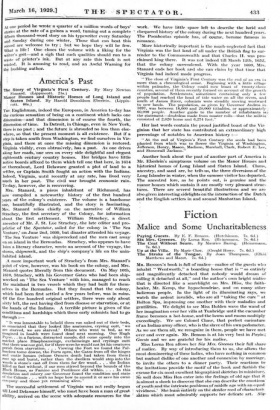Fiction
Malice and Some Uncharitableness
7s. (id.) Up at the Villa. By Marie Cher. (Gerald Howe. 7a. 6d.)
Ma. BENSON'S book is full of malice—malice of the guests who inhabit " Wentworth," a boarding house that is " so entirely and magnificently detached that nobody would dream of calling it detaChed at all," and the author's own bright Malice that is directed like a searchlight on Mrs. Bliss, the faith- healer, Mr. Kemp, the hypochondriac, and on many other ludicrous people. In the light of its illuminating rays, we watch the ardent invalids, who are all " taking the cure " at Bolton Spa, impressing one another with their maladies and gentilities. We delight to see Miss Holden wave the wand of her imagination over her villa at Tunbridge until the cucumber frame becomes a hot-house, and the lawns and rooms multiply exceedingly. We see Colonel Chase, that perfect caricature of an Indian army officer, who is the slave of his own pedometer. As we see them all, we recognize in them, people we have met over and over again. Mr. Benson is at his very best in Paying Guests and we are grateful for his malice.
Miss Lorna Rea allows her Six Mrs. Greenes their full share of malice. By way of introducing theta to us, she alloivs the most domineering of these ladies, who have nothing in common but mutual dislike of one another and connexion by marriage, to invite the others to a dinner party. Their reactions to the invitations 'provide the motif of the book and furnish the excuse for six most excellent biographical sketches in miniature.. SO well does Miss Rea enter into the feelings of old age that it is almost a shock to discover. that she can describe the emotions' of youth and the intricateprobleans of middle age with an equal vividness.' She leap's entirely on the slender reed of characteril. zistinia *Mich -most admirably supports her delicate art. Sb Greener is- a- first _novel, and we shall look forward to its In common with many of the great Russian writers, Mr. Baring has a certain fatalistic quality of craftsmanship, and a facility of presenting the world as a huge, malicious force. This characteristic is very marked in his new book. We see a young man, Christopher Trevenen, struggling against this seeming malice, stretching out his hand again and again- for , happinesses which are perpetually snatched away from him.. The legend of " the coat without seam," for which the soldiers at Calvary cast lots, has a peculiar influence over Christopher's destiny. It is " a significant bright stitch " in the pattern of his life as bewildering to us as it is to Christopher him- self.- Not Until the very last page of the book are we allowed to see the design as a whole, to interpret the allegory and to appreciate the subtlety of the very beautiful pattern that Mr. Baring has woven out of the threads of his own imagination. The author, as usual, holds the attention throughout the length of a long and fascinating novel.
Miss Marie Cher has a baffling trick of withholding her charreters from us. She has done it before, and in her new book, written in the first person, this trait is more marked than ever. She half shows us, through the eyes of a middle-aged woman, a group of people, who, though friends of each othera and 'friends of their observer, can never be friends of ours. We should like to know Silvio and Rose, the artists, Tatia, the sculptress, and all the other friends of the lady of the villa, but we are not allowed to. Perhaps the reason is that Miss Cher dces not begin at the beginning. We are never really introduced to this woman, who observes with such malice and detachment the doings of the people about her. As we read, we feel as though we are listening to the conversation of a stranger in a railway carriage, who discusses the peculiarities of people we have never seen. Misi Cher writes beautifully; 1:er descriptions of Rome are exquisite, and her malice is most amusing. If she would only cease to tantalize us she might become a great novelist.
MISS jOin Thompson has devated a whOle book to the saying • in Ecciesiasticus : " The stroke of the whip makes marks on the flesh, but the stroke of the tongue breaketh the bones." She shows the effect of village gossip and petty malice on the lives of three people, a country girl, a farmer, and the vicar of a rural parish. A birth, a death, and two marriages are all results of 'strokes of the tongue. Miss Thompson, who neither points a moral, nor shows one trace of humour has written a readable and well-balanced story, but we feel that she has sacrificed probability in order to make a bearably happy ending.
B. E. TODD.













































 Previous page
Previous page